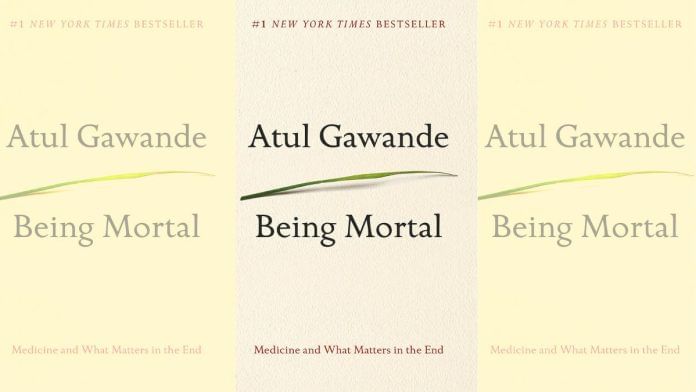Thank you dear subscribers, we are overwhelmed with your response.
Your Turn is a unique section from ThePrint featuring points of view from its subscribers. If you are a subscriber, have a point of view, please send it to us. If not, do subscribe here: https://theprint.in/subscribe/
It is death that allows life to remain alive! … It is a slap in the face to our illusion of omnipotence.” – Pope Francis
Overview
The book, by Atul Gawande, (https://amzn.in/d/1CmOsR1), a reputed Indian-origin, USA-based surgeon, is based on his reflections and conversations with reputed Geriatric (specialising in care for the elderly) doctors and elderly people.
The book addresses issues faced by people in the twilight of their lives. It contains several touching true stories of the end-of-life journey of elderly with life-threatening illnesses.
Reading the book was, for me, an education in coping with “aging with health issues”.
Some Takeaways
Aging is a distressing process. Slowly but surely, we lose, one by one, our abilities to function. We lose our balance, memory, posture, sight, hearing, ability to drive, to focus, etc. Accepting that this is natural is important as it encourages us to plan to handle the inevitable decline with more happiness and grace.
The power of medical science is immense but still finite and always will be. Doctors tend to treat death of a patient as a failure rather than an inevitable law of nature. They tend to focus on survival rather than well-being of the patient. Their mistaken view conflicts with a more dignified end-of-life experience for patients. For many, end-of-life is a medical experience with death in a hospital, typically surrounded by machines and strangers. It is well to have dialogues with doctors, choosing second opinions from doctors who are more aligned with our preferences, and trusting our judgment regarding the course of treatment.
A doctor’s role is “to help patients determine what they want”. This is best done by the doctor understanding the patient’s fears, hopes, and preferences, and guiding him with the available medical choices.
Our priorities for living are influenced by our perspective of how much more time we have for living.
Significant reduction in death rates (of 15%) were linked to fulfilling the human need for a reason to live.
Be aware of the changes in our body both by personal observation and medical advice.
Visit Geriatric specialists as their advice may be life-enhancing!
Be safe. If, for instance, your driving skills are significantly impaired, do not drive. The risk of someone over 85 driving is 4 times the risk of teenagers driving.
One of the biggest risks for old people is falling. The three biggest risks that lead to falling are: poor balance, more than 4 prescribed medications per day, and loss of muscle mass.
Deliberately focus on the task at hand instead of doing it automatically.
As many older people develop a stoop, they should look down while eating as otherwise there is a risk of choking.
Have a purpose, say, “to be of service, in some way, to those around you”. Even simple pleasures like taking care of a plant or cat or a stray dog, and, of course, people-visits, improve well-being of the sick!
Moving from home is usually distressing. A nursing home seems like a prison with its fixed rules and regulations where the resident has very little control over his life. Consider choices like “Assisted Living” where residents maintain significant freedom and autonomy.
“Living at any Cost” is not a good option. It may lead to horrific outcomes. It is sometimes better to postpone or forego medical treatments to improve the net quality of the remaining time.
Consider making a “Do Not Resuscitate” order. This will avoid end-of-life invasive medical procedures that may be unwelcome to you.
Palliative Hospice care, especially home hospice care, is a good option to consider for patients requiring nursing care.
Maintain relations so you have company to enliven your life.
Be realistic about your medical prognosis. While exceptions do happen, it is good to also plan for the more common outcomes.
Have “hard” honest conversations on topics like:
What is your understanding of the situation and the possible outcomes?
How much suffering & costs are you willing to endure to get for how many more days of worthwhile living?
What are the probabilities of any medical treatment’s benefits and possible side-effects?
When will living stop being worthwhile to you?
What are your hopes? Your fears? Your wishes after your demise?
Use the above responses to decide on treatment options including the option to forego further medical treatment.
“We all want to be the authors of our own stories, and in stories, endings matter”
These pieces are being published as they have been received – they have not been edited/fact-checked by ThePrint.


